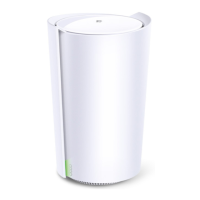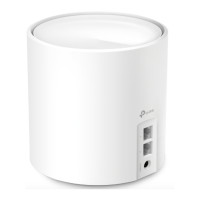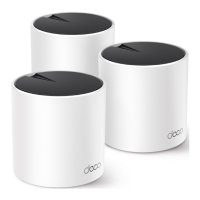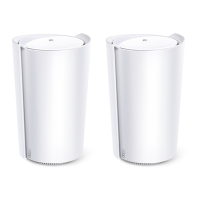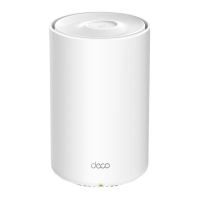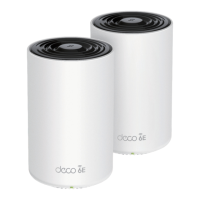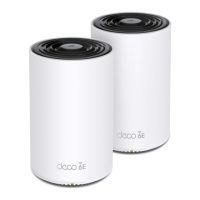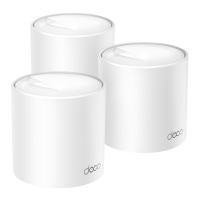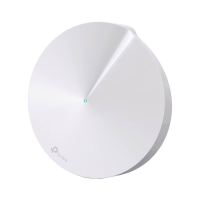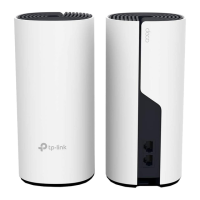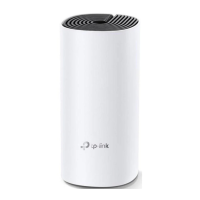Do you have a question about the TP-Link Deco X60 and is the answer not in the manual?
Explains conventions used in the guide, like Deco, Underline, Teal, Note, and Tips.
Provides links for product information, community discussion, and technical support.
Covers disclaimers on speed, MU-MIMO, HomeCare, IoT, and roaming performance.
Explains the meaning of different LED colors and patterns for device status.
Describes the RJ-45 Ethernet ports, power slot, and reset button.
Instructions on obtaining the Deco app via QR code or app stores.
Guides users through logging into or creating a TP-Link ID.
Details connecting the Deco to the modem or Ethernet outlet.
Explains how to assign a location to the Deco unit for naming.
Guides users on selecting the internet connection type and entering information.
Instructions for setting up the Wi-Fi network name and password.
How to connect devices to the newly created Deco Wi-Fi network.
Confirms setup is complete and advises connecting devices for better connections.
Instructions for adding more Deco units to expand network coverage.
Explains how to expand Wi-Fi coverage by adding more Deco units.
Guides users to select the specific Deco model they wish to add.
Shows how to find and confirm newly added Decos in the app interface.
Displays the overall network status and list of connected devices.
Provides access to HomeCare services like Antivirus and Parental Controls.
Shows how to access advanced settings like Wi-Fi, WPS, and updates.
How to view the working status of all Deco units in the app.
Accessing detailed information, MAC, IP, and performance for an individual Deco.
How to change or customize the location of a Deco unit.
How to check the working status and view details of connected devices.
Accessing options to manage individual device settings and priorities.
Adding unique profiles for devices to manage their online activities.
Steps to replace the current main Deco with any satellite Deco.
Explains the need to connect the new main Deco to the modem or Ethernet outlet.
Steps to create a new network via the Overview page.
Follows app instructions to finalize the new network setup process.
Steps to create a new network via the Menu page.
How to check Deco status before initiating removal or reboot.
Detailed steps to remove or reboot a Deco unit via the Deco app.
Refers to the physical reset button for factory default settings.
Explains how Antivirus protects against malicious websites and network attacks.
How to enable Antivirus features like Malicious Content Filter and IPS.
Allows filtering content, limiting time, and checking internet history.
Steps to create unique profiles for family members for content management.
How to set filter levels to block inappropriate categories and websites.
How to set daily time limits for internet usage per profile.
Helps set priority for applications and devices for better network performance.
How to set the total available bandwidth before configuring QoS.
How to prioritize online activities that are most important on the network.
How to add specific devices that require guaranteed network performance.
How to change the Wi-Fi name (SSID) and password for the main network.
How to create and manage a separate guest Wi-Fi network for visitors.
Methods for sharing Wi-Fi network details with family and friends.
How to compile a blacklist to prevent unauthorized devices from accessing the network.
Steps to add existing clients from a list or by MAC address to the blacklist.
How to view, remove, or manage devices currently on the blacklist.
How to update the Deco firmware to the latest version via the app.
Tips and steps for resolving issues if firmware updates fail.
How to view or change IPv4 internet connection type and details.
How to set up an IPv6 internet connection for your network.
How to add firewall rules to allow specific devices access via IPv6.
How to modify the LAN IP address to avoid potential IP address conflicts.
How to adjust DHCP server settings for IP address assignment.
How to enable IPTV/VLAN mode to support specific IPTV services.
How to enable MAC Clone to resolve internet connection issues.
How to reserve IP addresses for specific devices for easier management.
How to set up port forwarding rules to allow external access to network devices.
How to register a DDNS domain name for remote access to your router.
How to enable SIP ALG for communication with SIP servers via NAT.
Allows wireless devices to seamlessly switch connections between Deco units.
Concentrates Wi-Fi signals towards connected devices for stronger connections.
How to turn off the LED light and configure Night Mode for the LED.
How to change the operating mode between Router and Access Point.
How to set up alerts for client connection or disconnection events.
How to enable or disable specific alerts shown in the device's notification bar.
Explains WPS for quick and secure client connection without passwords.
Steps to connect a client to the network by enabling WPS on Deco and the client.
Reviews monthly usage statistics, security threats, and connected devices.
How to enable or disable the monthly report feature.
How to clear the recorded monthly report data.
How to add friends and family members to help manage the network.
How to set specific privileges for each network manager.
How to view and manage the list of authorized network managers.
Solutions for common setup problems like "We couldn't find Deco".
Answers to questions regarding wireless devices not connecting to Deco.
Solutions for issues where Deco suddenly loses internet access.
Guidance on how to find a suitable spot for Deco units for optimal coverage.
Solutions for problems encountered when the Deco app is not working correctly.
FCC compliance details for AX1800 Whole Home Mesh Wi-Fi 6 System models.
FCC compliance details for AX3000 Whole Home Mesh Wi-Fi 6 System models.
Contact information for TP-Link USA Corporation, the responsible party.
States the two conditions under which this device complies with FCC Part 15.
Information regarding FCC RF radiation exposure limits for the device.
Identifies the product as Class B and notes potential radio interference.
Lists the operating frequencies and maximum transmitted power for the device.
Declares the device's compliance with relevant EU directives.
EU RF exposure limits and restriction to indoor use in member states.
Compliance statement for devices sold in Canada.
Compliance statement regarding Industry Canada license-exempt RSS standards.
Specific warning statements applicable to devices used in Korea.
Regulatory notices from Taiwan's NCC and BSMI concerning radio frequency devices.
Essential safety advice and precautions for safe product operation.
Statement on the presence of restricted substances in the product's components.
Table detailing restricted substances and their presence, including exemptions.
Statement confirming product certification according to Ukrainian system regulations.
General safety information advising to keep the device away from water, fire, and humidity.
Precautions against disassembly, improper charging, and advice on installation location.
Explanation of various symbols found on the product label, such as DC voltage and caution.
Information about the WEEE symbol and proper recycling of the product.
| DSL WAN | - |
|---|---|
| Ethernet WAN | Yes |
| SIM card slot | No |
| WAN connection type | RJ-45 |
| Wi-Fi band | Dual-band (2.4 GHz / 5 GHz) |
| Wi-Fi standards | 802.11a, 802.11b, 802.11g, Wi-Fi 4 (802.11n), Wi-Fi 5 (802.11ac), Wi-Fi 6 (802.11ax) |
| Cabling technology | 10/100/1000Base-T(X) |
| Security algorithms | WPA, WPA-PSK, WPA2, WPA2-PSK, WPA3 |
| Networking standards | IEEE 802.11a, IEEE 802.11ac, IEEE 802.11ax, IEEE 802.11b, IEEE 802.11g, IEEE 802.11n |
| Wi-Fi data rate (max) | 2400 Mbit/s |
| Ethernet LAN data rates | 10, 100, 1000 Mbit/s |
| Ethernet interface type | Gigabit Ethernet |
| Type | Network repeater |
| Maximum transfer distance | - m |
| Antenna type | Internal |
| Product type | Tabletop router |
| Certification | CE, FCC, IC, NCC, BSMI, IDA, RCM, JPA, JRF, VCCI, KC, RoHS |
| Mounting type | Desk |
| Product color | White |
| LED indicators | Network, Power |
| Antennas quantity | 4 |
| Storage temperature (T-T) | -40 - 70 °C |
| Operating temperature (T-T) | 0 - 40 °C |
| Storage relative humidity (H-H) | 5 - 90 % |
| Operating relative humidity (H-H) | 10 - 90 % |
| Sustainability certificates | RoHS |
| Ethernet LAN (RJ-45) ports | 2 |
| Rate adjustment type | Automatic & manual |
| Firewall security | SPI |
| Processor frequency | 1000 MHz |
| Number of guest networks (5 GHz) | 1 |
| Mobile operating systems supported | Android 4.4, Android 5.0, Android 6.0, Android 7.0, Android 8.0, Android 9.0, iOS, iOS 10.0, iOS 11.0, iOS 12, iOS 13, iOS 9.0 |
| Top Wi-Fi standard | Wi-Fi 6 (802.11ax) |
| WLAN data transfer rate (max) | 2976 Mbit/s |
| WLAN data transfer rate (first band) | 574 Mbit/s |
| WLAN data transfer rate (second band) | 2402 Mbit/s |
| Output current | 1 A |
| Output voltage | 12 V |
| AC input voltage | 100 - 240 V |
| Power source type | DC |
| AC input frequency | 50 - 60 Hz |
| AC adapter frequency | 50/60 Hz |
| AC adapter input current | 0.8 A |
| AC adapter output current | 1.5 A |
| Cables included | LAN (RJ-45) |
| Number of products included | 1 pc(s) |
| Harmonized System (HS) code | 85171800 |
| Width | 110 mm |
|---|---|
| Height | 114 mm |
| Package depth | 194 mm |
| Package width | 220 mm |
| Package height | 125 mm |
| Package weight | 1210 g |
